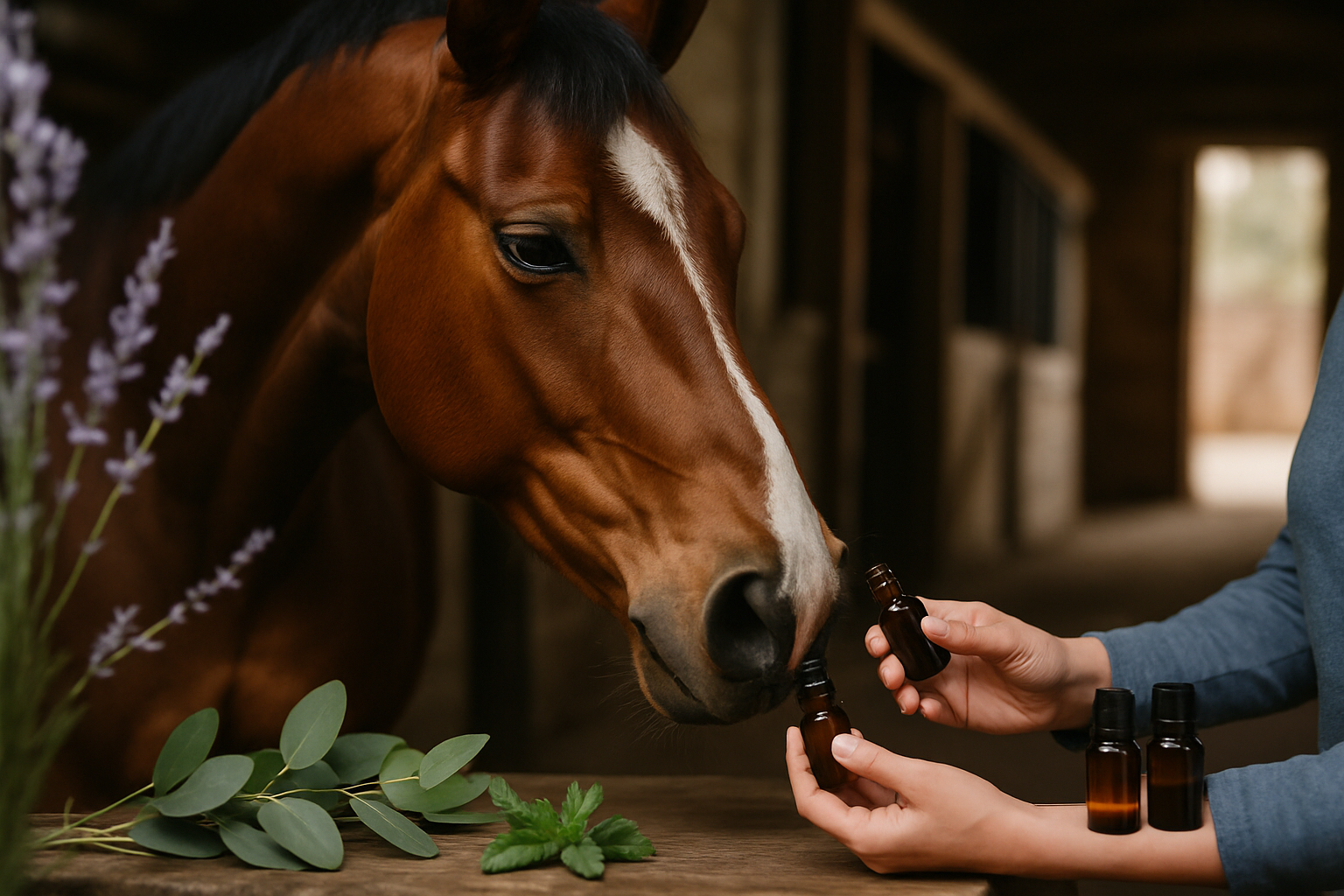Equine Aromatherapy: Enhancing Horse Wellness Through Scent
The world of equine care is constantly evolving, with new and innovative approaches emerging to enhance the well-being of these majestic creatures. One such trend gaining traction is equine aromatherapy, a holistic practice that harnesses the power of essential oils to promote physical and emotional balance in horses. This article delves into the fascinating realm of scent-based therapy for equines, exploring its potential benefits, applications, and growing popularity among horse owners and trainers.

The History of Aromatherapy in Animal Care
The use of aromatic plants for healing purposes dates back thousands of years, with evidence of their application in both human and animal care. Ancient Egyptians, Greeks, and Romans documented the use of essential oils for various therapeutic purposes, including treating ailments in horses and other domesticated animals. However, it wasn’t until the early 20th century that the term aromatherapy was coined, and its principles began to be systematically studied and applied in modern contexts.
In recent decades, the revival of interest in natural and holistic approaches to animal care has led to a renewed focus on aromatherapy for various species, including horses. Equine aromatherapy, in particular, has gained momentum as horse owners and trainers seek gentler, more natural alternatives to conventional treatments for a range of equine health and behavior issues.
Understanding the Science of Scent
At the heart of equine aromatherapy lies the complex relationship between scent and the horse’s nervous system. Horses, like many animals, have a highly developed sense of smell that plays a crucial role in their survival, communication, and overall well-being. When a horse inhales essential oil molecules, these aromatic compounds interact with olfactory receptors in the nasal passages, sending signals to the limbic system – the part of the brain responsible for emotions, memory, and behavior.
This direct connection between scent and the brain allows essential oils to potentially influence a horse’s mood, stress levels, and even certain physiological processes. Different essential oils are believed to have varying effects on horses, ranging from calming and sedating to invigorating and focusing. Understanding these interactions is key to effectively implementing aromatherapy in equine care.
Popular Essential Oils for Equine Use
A wide variety of essential oils are used in equine aromatherapy, each with its own unique properties and potential benefits. Some of the most commonly used oils include:
-
Lavender: Known for its calming and relaxing effects, lavender is often used to reduce anxiety and promote restful sleep in horses.
-
Peppermint: This invigorating oil is believed to help with focus and concentration, making it popular for use before training sessions or competitions.
-
Eucalyptus: With its respiratory-supporting properties, eucalyptus is frequently used to help horses with breathing issues or during cold weather.
-
Chamomile: This gentle oil is valued for its soothing effects on both the mind and body, making it useful for nervous or stressed horses.
-
Tea Tree: Known for its antimicrobial properties, tea tree oil is often used in blends designed to support skin health and wound healing.
It’s important to note that essential oils must be properly diluted and used with caution, as horses can be sensitive to certain scents and may have individual reactions.
Application Methods and Safety Considerations
Equine aromatherapy can be administered through various methods, each with its own advantages and considerations. Common application techniques include:
-
Diffusion: Using a specially designed barn diffuser to disperse essential oils into the air.
-
Topical application: Diluting essential oils with a carrier oil and applying them to specific areas of the horse’s body.
-
Inhalation: Allowing horses to inhale essential oils from a cloth or directly from the bottle.
-
Adding to grooming products: Incorporating diluted essential oils into shampoos, conditioners, or coat sprays.
Safety is paramount when using essential oils with horses. It’s crucial to work with a qualified equine aromatherapist or veterinarian experienced in aromatherapy to ensure proper selection, dilution, and application of essential oils. Some oils can be toxic if ingested or used improperly, and individual horses may have sensitivities or allergies to certain scents.
Research and Anecdotal Evidence
While scientific research specifically on equine aromatherapy is still limited, there is a growing body of anecdotal evidence supporting its potential benefits. Many horse owners and trainers report positive results in areas such as stress reduction, improved focus during training, and enhanced overall well-being. Some veterinary practices are also beginning to incorporate aromatherapy as a complementary therapy alongside conventional treatments.
Ongoing studies are exploring the measurable effects of essential oils on equine physiology and behavior. Researchers are investigating parameters such as heart rate variability, cortisol levels, and behavioral indicators to quantify the impact of aromatherapy on horses. As more data becomes available, it will help refine and validate aromatherapy protocols for equine care.
The Growing Market for Equine Aromatherapy Products
As interest in equine aromatherapy continues to grow, so does the market for related products and services. A variety of essential oil blends, diffusers, and application tools specifically designed for use with horses are now available. Prices for these products can range from relatively affordable (around $20-$50 for basic essential oil blends) to more expensive (upwards of $200-$300 for high-end diffusers or comprehensive aromatherapy kits).
Additionally, there is an emerging niche for equine aromatherapy education and certification programs. These courses, which can cost anywhere from a few hundred to several thousand dollars, aim to train horse owners, trainers, and veterinary professionals in the safe and effective use of essential oils with horses.
Future Directions and Integration with Conventional Care
As equine aromatherapy continues to evolve, there is growing interest in integrating this holistic approach with conventional veterinary care. Some veterinary clinics are exploring ways to incorporate aromatherapy into their practice, using it as a complementary therapy to enhance the overall treatment and well-being of their equine patients.
Looking ahead, researchers and practitioners are exploring new applications for equine aromatherapy, such as its potential use in performance horses to enhance focus and reduce competition-related stress. There is also ongoing work to develop standardized protocols and best practices for the use of essential oils in equine care, ensuring that this promising therapy can be safely and effectively implemented across the equestrian community.
In conclusion, equine aromatherapy represents an exciting frontier in horse care, offering a natural and potentially powerful tool for enhancing equine wellness. As research progresses and more horse owners embrace this holistic approach, we can expect to see continued growth and innovation in this fascinating field, ultimately benefiting the health and happiness of horses worldwide.






